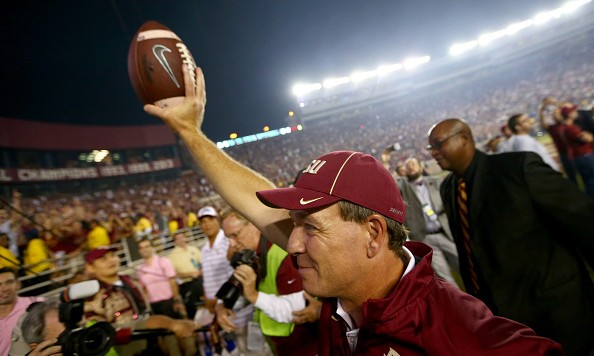It’s hard to emphasize just how amazing it is that FSU replaced a legendary coach with a great coach in Jimbo Fisher. Usually programs have trouble filling the gaping holes that figures like Bobby Bowden leave — not so with the Seminoles.
While questions surrounded some of his conservative tactics early in his career, Fisher made sure that those concerns were squashed and now has the hardware to show for it. Three ACC championships and one national championship has already cemented Fisher as one of the most accomplished coaches in Seminole history. The only question remaining is this: How much more can this program do?
One part of his legacy that absolutely cannot be ignored are the 36 draft picks that Fisher has sent to the league. Every year there are tales of teams that send plenty to the NFL but still have mediocre seasons (Miami, Florida, Washington) and FSU fans are happy to say that they are not part of that group. Fisher has never seen less than a 9-win season and has missed out on the ACC Championship only once in his tenure with the ‘Noles. Great recruiting classes turn into great seasons which turn into great results at the NFL Draft.
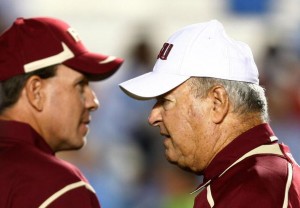
CHAPEL HILL, NC – OCTOBER 22: Florida State Seminoles Head Coach Bobby Bowden, (R) and Offensive Coordinator Jimbo Fisher watch the pregame action prior to the start of the game against the North Carolina Tar Heels at Kenan Stadium on October 22, 2009 in Chapel Hill, North Carolina. (Photo by Scott Halleran/Getty Images)
But how have Fisher’s draftees turned out in the NFL? The question is inherently unfair considering that coaches can’t really control how their guys perform after they get their first paycheck. Yet we still hold a lot of value in the results, probably because want to see how much of the success was due to the coach or the players themselves.
Guys like Gene Chizik rode their stars like Cam Newton and Nick Fairley all the way to a title, while Chris Petersen and the like, gave programs the most draft success it had ever seen. Hardly anybody will say that Fisher is carried by his players, but there still exists some tropes surrounding him that need to be cleared up. After those, we can much more clearly answer the question asked in the title.
Much has been made of Fisher’s track record with quarterbacks dating back to LSU, where he had six guys get drafted with almost none of them succeeding in the NFL. Matt Flynn seems to be the successful one of that group, which should tell you exactly how the rest including mega-bust Jamarcus Russell fared. Fisher has now had three quarterbacks drafted while at FSU, and the first two have fared similarly to his guys in Baton Rouge. So is Fisher’s system a black hole for NFL quarterbacks? Or is it just the luck of the draw?
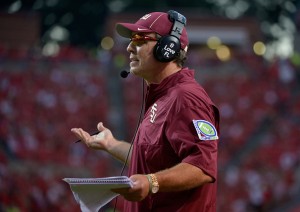
RALEIGH, NC – SEPTEMBER 27: Head coach Jimbo Fisher of the Florida State Seminoles questions a penalty during their game against the North Carolina State Wolfpack at Carter-Finley Stadium on September 27, 2014 in Raleigh, North Carolina. Florida State won 56-41. (Photo by Grant Halverson/Getty Images)
The first thing that needs to be stressed is that it is hard to succeed as a quarterback regardless of the system you come from. Obviously some colleges and coaches have more simple systems than what you will see in the NFL, but it’s not like the learning curve disappears for other prospects. To take a recent example: Jameis Winston might have an easier time adjusting to his offense than former Oregon quarterback Marcus Mariota, but he still has to learn the game just like any other quarterback drafted. It’s totally conceivable that Winston could not succeed in the NFL, but to immediately attribute it to Fisher’s system wouldn’t be wise.
Take a look at the rounds that all of his quarterbacks have been drafted in: At LSU he had one first rounder (Russell), one fourth rounder (Rohan Davey), one fifth rounder (Craig Nall), one sixth rounder (Josh Booty), and two seventh rounders (Matt Mauck and Matt Flynn). Besides Russell, none of those guys were expected to make waves in the NFL. As inspiring as stories like Tom Brady’s are, it’s very rare to find a starting quarterback anywhere past the first few rounds.
Go look at the current list of starting quarterbacks and see how many were drafted past the third round. Then look at the whole list and see how many are considered successful. You can’t be considered a bust unless you had very high expectations in the first place, and most of Fisher’s guys don’t fit that bill.
That leaves us with the conundrum of Christian Ponder and E.J. Manuel — two recent FSU quarterbacks who have not lived up to their first round draft status. Is this the piece of evidence that tells us Fisher’s quarterbacks don’t succeed?
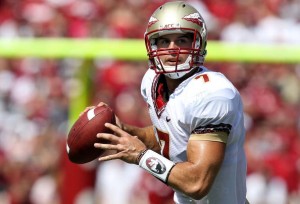
NORMAN, OK – SEPTEMBER 11: Quarterback Christian Ponder #7 of the Florida State Seminoles drops back to pass against the Oklahoma Sooners at Gaylord Family Oklahoma Memorial Stadium on September 11, 2010 in Norman, Oklahoma. (Photo by Ronald Martinez/Getty Images)
Not really. While it has been quite some time since one of his quarterbacks got drafted, a man by the name of Jeff Tedford used to have the same stigma around him. An ESPN article from 2005, while now hilarious, gives some more insight into what many people around the league were thinking of prospects under Tedford’s tutelage. How could Aaron Rodgers have any expectations of success when everyone else from his coach’s system had failed?
It is funny to think about in retrospect, but the very same issues were present with Tedford and his quarterbacks. All that was needed to revolutionize his legacy was one big hit…one shining star that would show everyone just how good his quarterbacks could be. Many people would be shocked to know that the well-known quarterback “gurus” have a lot more misses than hits. It’s just the nature of the position. Various players flame out and it often has little to do with the college they came from.
Oddly enough, the list of draftees that Fisher has coached can also bring him positive news. Many question Fisher’s ability to repeat his successes without Winston at the helm, instead saying that he will never get back to the mountaintop once his star quarterback leaves.
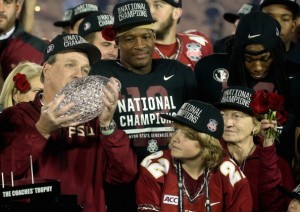
PASADENA, CA – JANUARY 06: Florida State Seminoles head coach Jimbo Fisher (L) holds the Coaches’ Trophy as quarterback Jameis Winston (center) #5 looks on after defeating the Auburn Tigers 34-31 in the 2014 Vizio BCS National Championship Game at the Rose Bowl on January 6, 2014 in Pasadena, California. (Photo by Stephen Dunn/Getty Images)
It’s much easier to dismiss this concern. Look at the amount of quarterbacks he has sent to the league and then try to say that he has no shot at getting another star at the position. How many more will have to be drafted before it’s just a given that he will find the answer at the position? Fisher won a BCS bowl and had two 10-plus win seasons before Winston. Would it really be shocking if he continued to do so without him?
Next year is shaping up to be his toughest yet, but that’s because his team just had 10 other players get drafted aside from Winston, who went first overall. Until something changes dramatically, it’s safe to assume that Fisher will continue his recent pattern.
That leaves us with the other 23 draft picks who were selected from Fisher’s Florida State teams and have played in the league. Looking at them across the board, here seems to be the breakdown of how his draft picks have done in the NFL:
Good: Kelvin Benjamin, Bryan Stork, Telvin Smith, Xavier Rhodes, Vince Williams, Nigel Bradham, Rodney Hudson, Mike Harris.
Bad: E.J. Manuel, Brandon Jenkins, Everett Dawkins, Zebrie Sanders, Andrew Datko, Christian Ponder, Markus White.
Too Early to Call: Devonta Freeman, Terrence Brooks, Timmy Jernigan, Lamarcus Joyner, Nick Moody, Dustin Hopkins, Chris Thompson, Tank Carradine, Bjorn Werner.
It’s a bit simplistic to be putting all of them into just three categories, but it still gives a good gauge of how they did. Obviously a lot will be too early to call because Fisher hasn’t been at FSU all that long when you think about it. It typically takes at least three years before we’re able to call how a guy has performed in the NFL, but that’s also only the beginning of their career. A lot will break through even later while others won’t even stay in the league. Brandon Jenkins and Andrew Datko are two examples of the latter.
With guys like Bjoern Werner, it’s unfair to say it’s totally his fault that he hasn’t taken the league by storm. He got switched to outside linebacker and his expectations totally changed. He had to learn a new position and change his technique to fit. It’s not really surprising that he has initially struggled and this year will be the one to tell us whether he fits more into the “Good” or “Bad” category.
Others like Chris Thompson or Dustin Hopkins are hard to judge. They are both late round picks who didn’t have high expectations surrounding them, yet they found mild success. Hopkins is hoping to be the starting kicker for the New Orleans Saints while Thompson is looking to be a contributor in Washington. At what point can either be said to have “made it” or not? As a fifth round pick, just staying with the team for a few years could qualify as a success, depending on how the team depth is at their position.
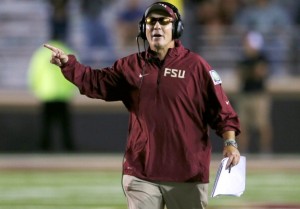
CHESTNUT HILL, MA – SEPTEMBER 28: Jimbo Fisher of the Florida State Seminoles reacts to an official’s call during a game with Boston College Eagles at Alumni Stadium on September 28, 2013 in Chestnut Hill, Massachusetts. (Photo by Jim Rogash/Getty Images)
If we wanted to make it more complex, we would have to note which guys Fisher recruited and which ones had him as a coach for the majority of their college careers. Coaches often times need to recruit their own players to make sure their system works to its best ability, so at least a few of the previously mentioned players aren’t really a product of Fisher.
Overall it looks like Fisher has a well deserved reputation with the NFL Draft. He’s able to bring in highly-ranked recruiting classes and turn them into record-breaking draft classes — but not before dominating in the college football world. Some will point to his quarterbacks as a criticism, but it needs to be put into context. When looking at other highly-regarded coaches, Fisher compares nicely. He’s had multiple first round quarterbacks and consistent production at the position.
As mentioned in the beginning of this piece, FSU fans should be thankful for how lucky they’ve been in getting a worthy successor to legendary Bobby Bowden. As long as Jimbo Fisher is Florida State’s head coach, expect the same draft domination we’ve seen the past few years.




















